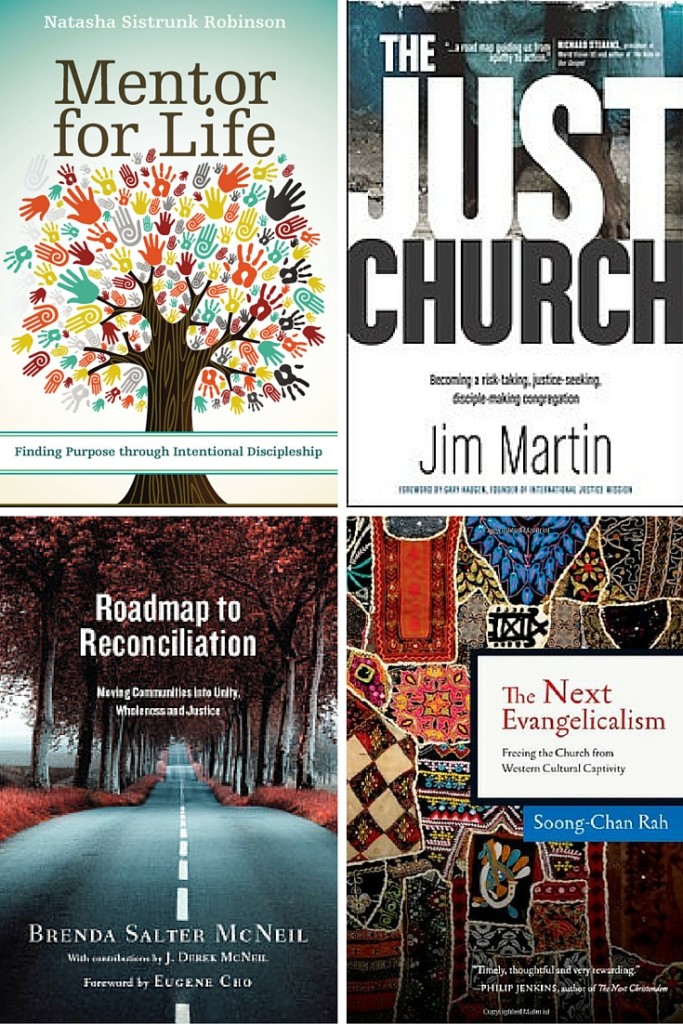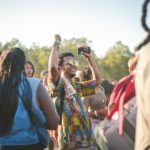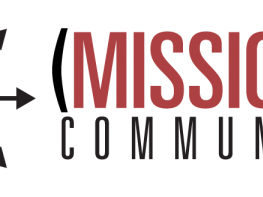The following is a collaboration of two members of our Writing Team, Natasha Sistrunk Robinson and Ruthie Johnson.
A Lack of Resources
I recently heard this from a Pastor:
“I can find plenty of resources of missional communities as vehicles designed to help groups of people engage in some sort of common mission together. And I can find other resources that deal with the issue of multi-cultural churches. What I can’t find are any resources or perspectives on how to form or lead multi-cultural missional communities.”
Natasha
When I (Natasha) first read these words, my heart was both excited that a pastor was expressing this reality and saddened that there are so few resources for such an important need–and unfortunately, the resources that are available from diverse voices are not necessarily being read by our pastors. I am honored that Ruthie Johnson has asked me to partner with her to address this concern–she as an experienced practitioner, I as a budding theologian, and both of us being committed and invested in the multi-cultural relationships, multi-cultural ministry, advocacy, and justice work. Our academic training and practical experiences have led to the following observations. I can't find any resources on how to form or lead multi-cultural missional communities. Click To Tweet
Shaping multi-cultural missional communities require:
- Patience and a delicate pursuit of the long-term vision of a multi-cultural missional community,
- A willingness to understand our own strengths and weakness as we also embrace the strength and weaknesses of others within the body,
- A willingness to seek-out, listen to, and learn from the diverse voices within your missional community, and
- A willingness to seek out and learn from other diverse voices that are also doing similar work- consider them as resources for learning and study, embrace their mentorship, and maybe even consider partnerships.

The resources pastors read to equip them for shepherding, especially in a multi-cultural context, matter. Not too long ago, I had the opportunity of presenting a workshop at a very large church-planting and missional conference.
Several publishers were present and selling books to these pastors and church-planters. Most of the titles or themes of those books had something to do with tips and techniques on leadership or church growth. There were a few commentaries and spiritual formation books available but by and large, there were hardly any on the topics of justice. There were also very few resources that were authored by women or people of color. When there is a request for resources, especially about multi-cultural ministry and relationships, diverse perspectives and voices must be intentionally sought out. In order to effectively reach and lead diverse people groups, we must value diverse voices in the kingdom.
Ruthie
I’m always encouraged and humbled when someone wants to pursue the hard-work of representing God’s diverse kingdom. Often at Missio Alliance, we approach the ‘why’ part of the Kingdom. We are committed to engaging in thoughtful reading and dialogue to pursue and form “a Church reimagined for a world recreated,” but that also leaves us with a ‘how’ question. Our world is continually re-creating itself in light of time, technology and migration, making the vision of multiethnicity an increased reality for our churches, and hopefully in our personal relationships.
I’ve worked with a handful of church-planters wanting to start multiethnic churches and have also been a part of church-leadership teams asking the questions about ‘how’ multiethnic ministry is done. The truth is, pursuing multiethnicity is a lifelong goal, there isn’t a magic button to make it all work together neatly. Rather, it takes a team dedicated to the vision of Christ and to the work of continually reforming their hearts and minds through listening and intentional engagement until we reach that vision.
My master’s thesis revolved around organization identity and multiethnicity. Like this pastor, when I was reading and researching this issue, I was able to find a lot of information on “why” multiethnic, but not so much on “how.” My thesis was a work in response to the ‘how’ of multiethnicity. To do this, I took the angle of studying identity. I looked at individual identity formation, specifically how identity is shaped when influenced by multiple cultures (think: biracial/multicultural). From there I went on to discuss how one’s individual identity shapes and contributes to the identity of different organizations or groups we are a part of.
Pursuing Multiethnicity
When we invest in anything, it is important to be mindful of how our identity is shaped and reflected in what we produce. On an organizational level it shows up as: “you attract who you are.” Social psychologist and professor, Dr. Christena Cleveland, addresses a lot of this reality in her well researched book, Disunity in Christ: Uncovering the Hidden Forces That Keep Us Apart. This is not a new phenomena; it reveals a need for the leader to be highly conscious and intentional of how they pursue multi-ethnic and multi-cultural ministry.
When we multiply ourselves through our leadership, we multiply our strengths, gifts and talents, but also our weaknesses, and biases. This is why a diverse leadership team is imperative in multiethnic formation. When thinking about practical and holistic ministry, leaders must be holistic in their view of multiethnicity– including a personal examination of their strengths, weaknesses, blind spots, and biases. This humble evaluation and reflection puts a person in a position to receive feedback on how their actions, attitudes and perceptions are received by others. When done in the context of community, asking “How do I show up?” provides opportunity for rich feedback and growth as a team where ideas can be exchanged and challenged. This is necessary because multiethnicity and multiculturalism is a work of partnership.
Like Ruthie, I (Natasha) have had the pleasure of participating in and leading multi-ethnic groups. For me, multi-cultural missional communities flow out of an intentional and holistic approach to discipleship. The 2010 Lausanne Congress had a vision for “The Whole Church to take the Whole Gospel to the Whole World.” Within the last decade or so, many evangelical pastors and leaders have been awakened and convicted of this call.The whole gospel must include both a strong theological and evangelistic focus, and have a missional, communual, and justice intentionality. Whether leading a small group, teaching a Bible study, or pursuing justice and community advocacy work, I come back to the foundational and holistic approach to discipleship as outlined in my book, Mentor for Life: Finding Purpose through Intentional Discipleship: Knowing and Loving God, Affirming our Identity in Christ, and Loving our Neighbors.
Pure love results in obedience to God and intentional acts of relationship building and justice-seeking on behalf of our neighbors. Theology is only good if it is biblically grounded, and relationally and ethically practiced. As pastors and church leaders, we have a responsibility to cultivate relationships that function communally in small groups that are diverse and inclusive. This intentional act of disciple-making requires the spiritual discipline of listening, learning, and serving on behalf of the church leaders, lay leaders and practitioners, as well as the weaker or most vulnerable members of the body. For, “we cannot wholeheartedly of effectively make disciples of all nations and fulfill the Great Commission if we have limited scope and poor vision that prevents us from loving our neighbor across town or down the street.” Theology is only good if it is biblically grounded & relationally & ethically practiced. Click To Tweet
What We Miss Out On
Over the past year, I have had the honor of serving on the Board of Directors for a private Christian school that was intentionally planted in a disadvantaged urban neighborhood by members of the church where we worship. Several of the members of our multi-ethnic church have answered the call to move into the neighborhood. The school mostly serves students from African American and Hispanic backgrounds. However, most of the board members are not people of color, and only one of the board members lives in the community. As an African-American Board member who has loved ones living in the same conditions as some of these children, I felt it important that my colleagues and I hear from the community about how the school can best serve their families. From the early stages of my tenure, I have been championing to get parents of our students on the board. In I Corinthians chapter 12, the Apostle Paul writes about the importance of giving double honor to those who are considered weaker vessels in the body.
As Ruthie mentioned, we often attract who we are and that prevents us from listening well, seeing different perspectives, and making the best decisions for the entire community. We may think we have all the answers but we miss out when we only listen to those who are just like us. What we really need is to ask others who may have deeper insights on issues, especially when we are uninformed, relationally disconnected, or are so far removed from the reality and challenges that people of color face. So the compassion of head knowledge, heart convictions, practical tools and techniques, must also be balanced with a humble submission to God and others in a diverse listening and learning community that is called to both theological reflection and practical action.








Missio Alliance Comment Policy
The Missio Alliance Writing Collectives exist as a ministry of writing to resource theological practitioners for mission. From our Leading Voices to our regular Writing Team and those invited to publish with us as Community Voices, we are creating a space for thoughtful engagement of critical issues and questions facing the North American Church in God’s mission. This sort of thoughtful engagement is something that we seek to engender not only in our publishing, but in conversations that unfold as a result in the comment section of our articles.
Unfortunately, because of the relational distance introduced by online communication, “thoughtful engagement” and “comment sections” seldom go hand in hand. At the same time, censorship of comments by those who disagree with points made by authors, whose anger or limited perspective taints their words, or who simply feel the need to express their own opinion on a topic without any meaningful engagement with the article or comment in question can mask an important window into the true state of Christian discourse. As such, Missio Alliance sets forth the following suggestions for those who wish to engage in conversation around our writing:
1. Seek to understand the author’s intent.
If you disagree with something the an author said, consider framing your response as, “I hear you as saying _________. Am I understanding you correctly? If so, here’s why I disagree. _____________.
2. Seek to make your own voice heard.
We deeply desire and value the voice and perspective of our readers. However you may react to an article we publish or a fellow commenter, we encourage you to set forth that reaction is the most constructive way possible. Use your voice and perspective to move conversation forward rather than shut it down.
3. Share your story.
One of our favorite tenants is that “an enemy is someone whose story we haven’t heard.” Very often disagreements and rants are the result of people talking past rather than to one another. Everyone’s perspective is intimately bound up with their own stories – their contexts and experiences. We encourage you to couch your comments in whatever aspect of your own story might help others understand where you are coming from.
In view of those suggestions for shaping conversation on our site and in an effort to curate a hospitable space of open conversation, Missio Alliance may delete comments and/or ban users who show no regard for constructive engagement, especially those whose comments are easily construed as trolling, threatening, or abusive.